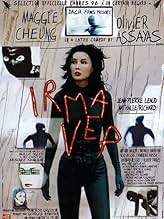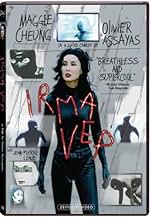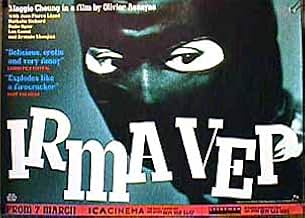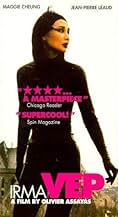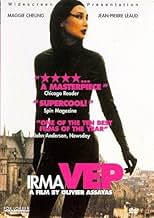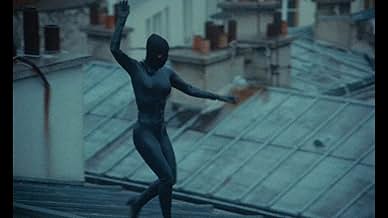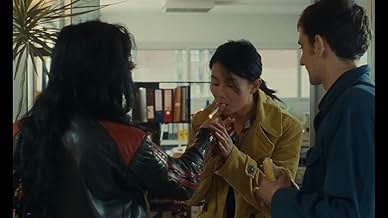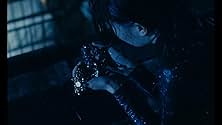Irma Vep
- 1996
- Tous publics
- 1h 39min
NOTE IMDb
7,0/10
10 k
MA NOTE
Une actrice de cinéma chinoise vient en France pour jouer dans un remake de « Les Vampires ». Elle se retrouve devant des complots mesquins et des égos qui s'affrontent sur le plateau.Une actrice de cinéma chinoise vient en France pour jouer dans un remake de « Les Vampires ». Elle se retrouve devant des complots mesquins et des égos qui s'affrontent sur le plateau.Une actrice de cinéma chinoise vient en France pour jouer dans un remake de « Les Vampires ». Elle se retrouve devant des complots mesquins et des égos qui s'affrontent sur le plateau.
- Réalisation
- Scénario
- Casting principal
- Récompenses
- 2 victoires et 3 nominations au total
Avis à la une
Irma Vep is a film about film-making, an insightful and disturbing film which delivers some beautiful voyeuristic glimpses of vampirism, realist cinema, gritty black-and-white cine-retro and the old men who were once the chic of the French avant-garde film clique.
IMDb says: "Rene Vidal, a director in decline, decides to remake Louis Feuillade's silent serial Les Vampires" but this summary does not mention the real star of the film - Hong Kong kung-fu actress Maggie Cheung, playing herself. She is perfect as the exotic object, the ephemeral other, the object of desire who finds herself at the centre of the film's obsessive and sexually driven visual vortex.
In the privacy of her hotel room, Maggie Cheung zips herself into a full-body black latex catsuit which is going to be her vampire costume on the film set the next day. Maybe she is just getting into character, or maybe she shares something of the director's fascination with nocturnal life... predatory sexuality... visual fixation... the bound female form... anyway, the film really comes to life as she creeps through the hotel, her haunting feline eyes piercing through the spooky-sexy costume... the suspense here is that she is enacting her own vampire fantasy, of her own accord, not under the director's gaze. Maggie Cheung, all alone, on the roof, in the rain, exploring her own version of a male fantasy sequence. This is an unforgettable moment in art-house cinema.
The film really does justice to its themes, with the male characters degenerating from visionaries into voyeurs, and the female characters showing real depth in their willingness to accommodate the male gaze without losing their savvy post-fem powers. If you are a predictable guy like me, you will love the French-Asian grrrl power, which gives the film a pulse.
The theme of visual obsession is presented very well: the director is shouting, the cameras are rolling, and Maggie Cheung, in her catsuit, is ready to suck blood. In these moments she is bound but free, powerless but in control, objectified but liberated. I suppose this makes the film contentious and provocative, but I thought the message was very clear.
Without spoiling the end of the film: the last five minutes of Irma Vep is totally unique. You will never see another film which ends like this one. I can only describe it as a profoundly futile gesture, an act of great passion and impotence, and a brilliant moment in Lettrist art. It is Rene Vidal's last stand, a terrible but beautiful moment caught on celluloid: the work of a madman? a savant? a genius? you can decide, but I am sure you will agree that Irma Vep does a lot more than just scratch the surface of modern film art.
If you like Irma Vep, check out Shadow Of The Vampire as well.
IMDb says: "Rene Vidal, a director in decline, decides to remake Louis Feuillade's silent serial Les Vampires" but this summary does not mention the real star of the film - Hong Kong kung-fu actress Maggie Cheung, playing herself. She is perfect as the exotic object, the ephemeral other, the object of desire who finds herself at the centre of the film's obsessive and sexually driven visual vortex.
In the privacy of her hotel room, Maggie Cheung zips herself into a full-body black latex catsuit which is going to be her vampire costume on the film set the next day. Maybe she is just getting into character, or maybe she shares something of the director's fascination with nocturnal life... predatory sexuality... visual fixation... the bound female form... anyway, the film really comes to life as she creeps through the hotel, her haunting feline eyes piercing through the spooky-sexy costume... the suspense here is that she is enacting her own vampire fantasy, of her own accord, not under the director's gaze. Maggie Cheung, all alone, on the roof, in the rain, exploring her own version of a male fantasy sequence. This is an unforgettable moment in art-house cinema.
The film really does justice to its themes, with the male characters degenerating from visionaries into voyeurs, and the female characters showing real depth in their willingness to accommodate the male gaze without losing their savvy post-fem powers. If you are a predictable guy like me, you will love the French-Asian grrrl power, which gives the film a pulse.
The theme of visual obsession is presented very well: the director is shouting, the cameras are rolling, and Maggie Cheung, in her catsuit, is ready to suck blood. In these moments she is bound but free, powerless but in control, objectified but liberated. I suppose this makes the film contentious and provocative, but I thought the message was very clear.
Without spoiling the end of the film: the last five minutes of Irma Vep is totally unique. You will never see another film which ends like this one. I can only describe it as a profoundly futile gesture, an act of great passion and impotence, and a brilliant moment in Lettrist art. It is Rene Vidal's last stand, a terrible but beautiful moment caught on celluloid: the work of a madman? a savant? a genius? you can decide, but I am sure you will agree that Irma Vep does a lot more than just scratch the surface of modern film art.
If you like Irma Vep, check out Shadow Of The Vampire as well.
This is a very solid film, make no mistake, but it tends to play more like a testing ground for various elements of Olivier Assayas' overall style, particularly those which he would later explore more fully in his later masterpiece "Demonlover", than any sort of cohesive narrative statement. It's not very often that a film strikes me as not having enough of a plot, but in the case of this there did seem to be a certain irrelevance to it all. There's nothing really new about the "making a movie" movie, and this doesn't add much to the mix, although i do think it is well done for what it is, and occasionally even approaches a sort of proto-"Lost in Translation", with Paris standing in for Tokyo and Maggie Cheung's Asian "otherness" replacing Bill Murray's fish-out-of-water Americanness. But the film is never really focused enough to compare in any significant way to that film. "Irma Vep" really only comes alive when Assayas gets away from his nagging tendency towards a certain French talkiness and indulges in the moments of pure visual cinema that make up the other half of his general approach (and which seem to be invested with much more enthusiasm here) , such as the scene scored to Sonic Youth's "Tunic" (another foreshadowing of "Demonlover"). Certainly he does have a way with capturing pretty little images of neon lights reflecting through car windows and things like that, enough that I can acknowledge he is definitely a talented filmmaker, but within this film he never quite finds the correct way to integrate his little artistic flourishes into the whole, and overall the film feels more like a collection of separate ideas than a cohesive statement of any kind.
French director Jean-Pierre Léaud decides to remake Feuillade's silent serial LES VAMPIRES as a modern feature. He decides to cast Maggie Cheung as Irma Vep based on seeing her in one movie in Marrakesh. When the movie opens, Miss Cheung has just arrived at Léaud's office in the last throes of pre-production, whence she is whisked away to a sex shop to buy a gimp suit to be modified for her costume. After that, things become chaotic, with spoiled takes, spoiled tempers and journalists who lecture her on how to make films.
Miss Cheung is wonderful in the role, a sweet-faced, slightly puzzled woman stranded alone in Paris, trying to perform her part in her first international production, while chaos swirls about her.
There is a lovely, impromptu feel about Olivier Assayas' movie. It feels as if he started out trying to do the remake, and as that became impossible, switched to a different film. That seems unlikely. Undoubtedly that was the look and feel he was trying for. The result is an amusing, slightly tentative effort that makes me wish to look at LES VAMPIRES again.
Miss Cheung is wonderful in the role, a sweet-faced, slightly puzzled woman stranded alone in Paris, trying to perform her part in her first international production, while chaos swirls about her.
There is a lovely, impromptu feel about Olivier Assayas' movie. It feels as if he started out trying to do the remake, and as that became impossible, switched to a different film. That seems unlikely. Undoubtedly that was the look and feel he was trying for. The result is an amusing, slightly tentative effort that makes me wish to look at LES VAMPIRES again.
I feel downright churlish for not going completely crazy for this funny/sad look at movie- making -- specifically the rather absurd, doomed remaking of a real French classic, by an aging, out of style art-house director, starring Hong Kong action heroine Maggie Chung, who plays herself delightfully.
I enjoyed the film; its sort of a complex 1990s 'Day for Night', with a paradoxical and sometimes confusing point of view about the nature of art and the state of film.
But I couldn't see it for the masterpiece a number of intelligent critics gave it credit for being. Jonathan Rosenbaum, the terrific critic from the Chicago Reader wrote a very long, in depth analysis that went right over my head, and then added insult to injury by implying that people who don't see the film as a deep investigation of the evils of capitalism, and the meaning of ART are somehow shallow.
I'm also surprised by the number of people who take the ramblings of an obnoxious reporter character in the film about the death of French art cinema as being the film's point of view on these issues. To me the film isn't taking sides, and seems to be gently satirizing, and yet embracing all of film.
Good natured, well acted, and occasionally brave (but also occasionally obscure) I quite enjoyed this and it did provoke some thinking. But I couldn't see it as the super deep film some did. For me, it was fun, but the ideas are far less deep or radical then critics seem to want to give them credit for being.
I enjoyed the film; its sort of a complex 1990s 'Day for Night', with a paradoxical and sometimes confusing point of view about the nature of art and the state of film.
But I couldn't see it for the masterpiece a number of intelligent critics gave it credit for being. Jonathan Rosenbaum, the terrific critic from the Chicago Reader wrote a very long, in depth analysis that went right over my head, and then added insult to injury by implying that people who don't see the film as a deep investigation of the evils of capitalism, and the meaning of ART are somehow shallow.
I'm also surprised by the number of people who take the ramblings of an obnoxious reporter character in the film about the death of French art cinema as being the film's point of view on these issues. To me the film isn't taking sides, and seems to be gently satirizing, and yet embracing all of film.
Good natured, well acted, and occasionally brave (but also occasionally obscure) I quite enjoyed this and it did provoke some thinking. But I couldn't see it as the super deep film some did. For me, it was fun, but the ideas are far less deep or radical then critics seem to want to give them credit for being.
I just watched Irma Vep last night. And I have to say that I enjoyed watching this movie for many reasons. Evidently Maggie is one of the reasons. Beautiful of course and good actress to boot. But beyond that, we have a lot of other things that kept my interest alive all along. This movie presents a self examination of French movie making, thereby justifying the accusation of "nombrilisme" (narcissism) by the reporter interviewing Maggy. This seems to be one of the themes here. A close look at the movie making process in France where a certain lack of coordination seems to be the rule, where a director launches the movie making only based on a whim. And in this case, it's the idea of having Maggie Cheung play the main role of a character in a remake of a 1915 silent movie. What really becomes interesting is the way she gets into the role and really becomes Irma. But I will leave you to discover how and when. At any rate, the movie has the funny effect to make you wonder if French movie making is in that bad a state that it can come up with such an interesting product.
Le saviez-vous
- AnecdotesMuch of the film depicts set-related incidents that echo scenes in François Truffaut's La nuit américaine (1973), to which Irma Vep owes a large thematic debt. However, Olivier Assayas publicly stated that although he considers La nuit américaine (1973) a great film, it is more about the fantasy of filmmaking than the reality. Assayas credits Rainer Werner Fassbinder's Prenez garde à la sainte putain (1971) as a greater inspiration.
- GaffesAfter René says, "respect the silence" to Maggie, he speaks to a woman and takes a drink from a big plastic Coke bottle. He screws the cap on, then hands her the bottle. She turns around, and the cap is missing.
- ConnexionsFeatured in Le septième ciel (1997)
Meilleurs choix
Connectez-vous pour évaluer et suivre la liste de favoris afin de recevoir des recommandations personnalisées
- How long is Irma Vep?Alimenté par Alexa
Détails
Box-office
- Montant brut aux États-Unis et au Canada
- 282 310 $US
- Week-end de sortie aux États-Unis et au Canada
- 11 852 $US
- 4 mai 1997
- Montant brut mondial
- 315 015 $US
- Durée1 heure 39 minutes
- Couleur
- Mixage
- Rapport de forme
- 1.66 : 1
Contribuer à cette page
Suggérer une modification ou ajouter du contenu manquant



